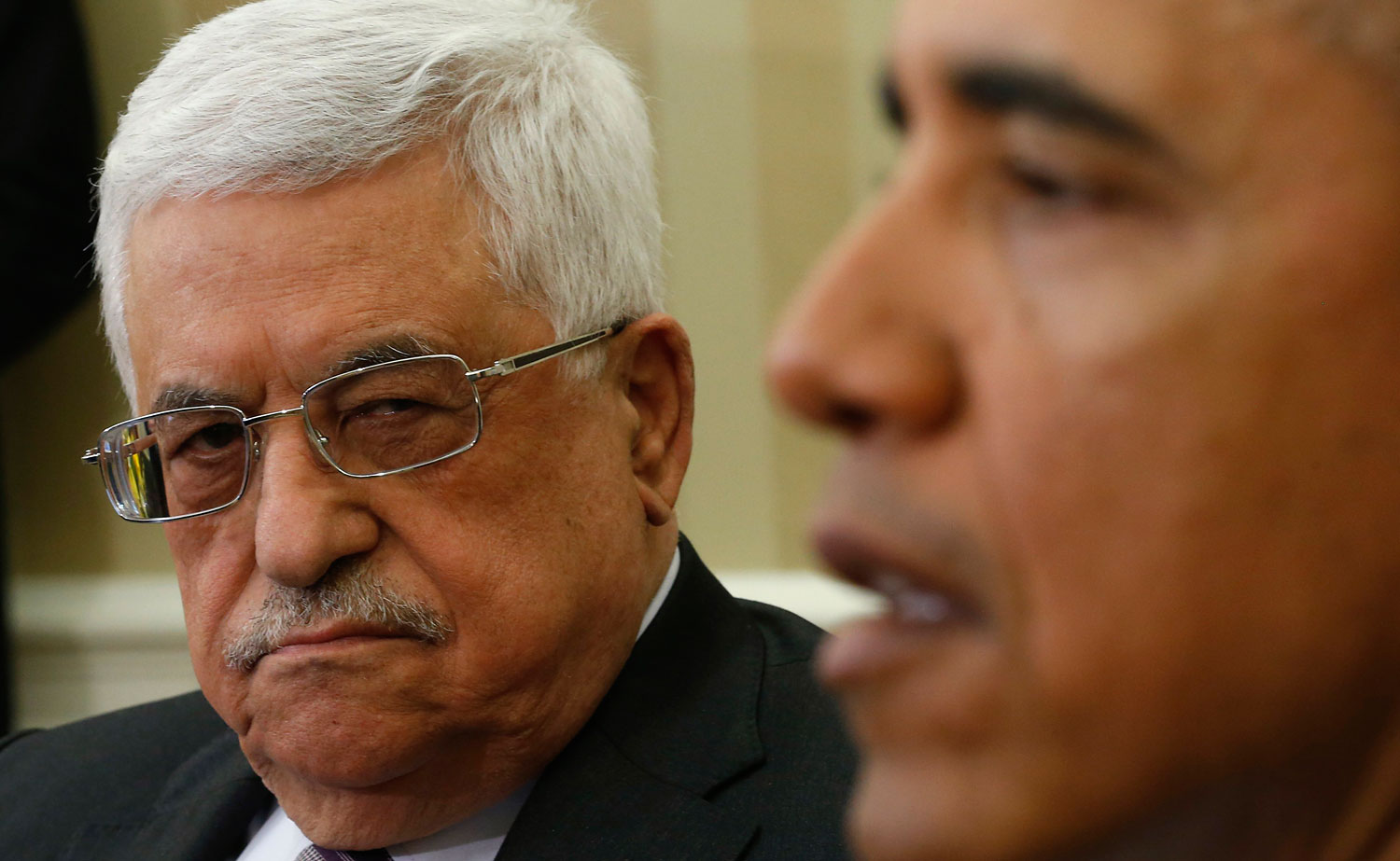
Mahmoud Abbas, the Palestinian Authority President who has built his career on his willingness to negotiate, goes to the White House today with his work cut out for him. President Obama will pressure the Palestinian moderate to continue peace negotiations with Israel beyond their April deadline, even though the talks have gone so poorly that Secretary of State John Kerry months ago abandoned hope for a final agreement by next month and made the goal a “framework” statement describing U.S. hopes for a pact.
Abbas, who owes a measure of his position in the Palestinian leadership to Washington’s historical support of his moderate approach, may be personally inclined to give Obama what he wants. He has little personal appetite for the alternative – confrontation, either at the United Nations, which convenes in September, in the marketplace, where activists are promoting a boycott of Israel’s West Bank settlements (or of Israel itself), or even the streets, where violence is lately growing.
But Abbas’ position was a lonely one from the start; the leadership councils of the Palestine Liberation Organization and his own Fatah party strongly opposed even beginning talks last summer. And the days before his departure for Washington showcased how visibly Palestinian politics has fractured in recent months, further undermining Abbas’ claim that he can negotiate on behalf of all Palestinians.
In the Gaza Strip, the population of 1.7 million is governed not by Abbas’ Palestinian Authority but by Hamas, the militant party that won 2006 legislative elections a year after Abbas was elected president. Hamas kicked Fatah out of Gaza in 2007. Founded on a premise of relentless armed resistance, Hamas famously refuses to acknowledge Israel’s right to exist, or even the point of negotiations.
“Hamas is not a problem,” Abbas said in a January. “Just leave it to us.” But it appears to be a persistent problem. Just Sunday, when Fatah tried to put its people on the streets of Gaza City – to make the kind of show of popular support for Abbas that was mounted in Ramallah and elsewhere on the West Bank – Hamas barred the demonstration.
Which is not to say Hamas has a firm grip on Gaza. The group has been isolated by neighboring Egypt, which last month declared Hamas a terrorist organization, and appeared powerless last week to prevent Islamic Jihad, a more radical militant group also supported by Iran, from launching scores of rockets into Israel. The barrage breached a ceasefire Hamas had effectively enforced for 16 months, and suggested that Gaza, already divided from the West Bank, was splitting into more political shards.
Meanwhile, in the West Bank, home of another 2.5 million Palestinians, Abbas struggled to appear in charge of Fatah, the secular party that has long dominated Palestinian politics. He lashed out on March 10 against a political rival he had already cast into exile three years ago – the former Fatah security chief in Gaza, Mohammad Dahlan – claiming Dahlan had ordered six murders and suggesting he had been involved in the mysterious death of Fatah founder Yasser Arafat. “Who killed Yasser Arafat?” Abbas asked a closed meeting of party leadership, in remarks later cleared for publication. “This is not evidence, but indications that deserve consideration.”
It all distracts from Abbas’ ceaseless efforts to burnish the image of statesmanship, and recast the image of the Palestinian movement. It also raises the stakes for the meeting with Obama, given that talks are supported by just half of Palestinians. A large majority feels the negotiations are doomed, according to polls. “Most Palestinians do not trust the process,” says Khalil Shikaki, director of the Palestinian Center for Policy and Survey Research, a polling firm based in Ramallah.
A report in the pan-Arab daily Al-Hayat says Abbas will leverage the one thing he can offer — his continued participation in the talks. The price, according to the report, will be a freeze on further construction of Jewish settlements, plus the release of more Palestinian prisoners held by Israel. Prisoner releases do serve to shore up support for a Palestinian leader, but Al-Hayat says Abbas will up the stakes by demanding freedom for two prisoners who are leaders themselves: Ahmed Sa’adat, head of the leftist Popular Front for the Liberation of Palestine, and Marwan Barghouti, a Fatah activist so popular he often prevailed in presidential polls even while a prisoner.
It would be a bold request. Sa’adat was sentenced to 30 years in 2008 by an Israeli court that held him responsible for a 2001 terror attack that killed Israel’s tourism minister. Barghouti was sentenced to five life terms in 2004 for ordering terror attacks during the Second Intifada. “He should rot in jail until he dies,” Israeli Transportation Minister Yisrael Katz posted on Facebook after hearing the report. The release of either would revivify the Palestinian political landscape simply by virtue of being what those politics have ceased to be – unexpected.
More Must-Reads from TIME
- Donald Trump Is TIME's 2024 Person of the Year
- Why We Chose Trump as Person of the Year
- Is Intermittent Fasting Good or Bad for You?
- The 100 Must-Read Books of 2024
- The 20 Best Christmas TV Episodes
- Column: If Optimism Feels Ridiculous Now, Try Hope
- The Future of Climate Action Is Trade Policy
- Merle Bombardieri Is Helping People Make the Baby Decision
Contact us at letters@time.com